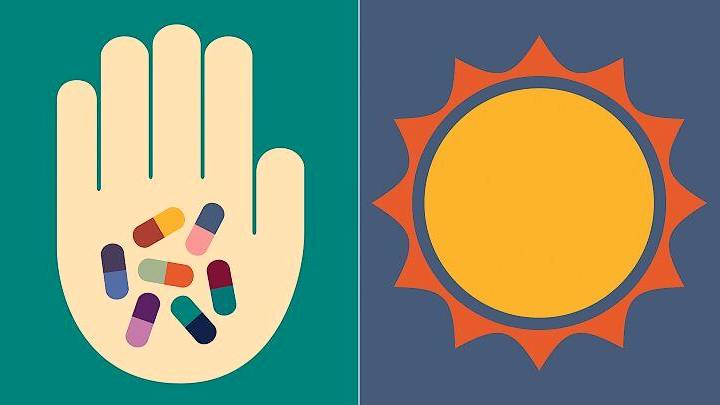 Medication often taken for IBD and the rays of the sun can combine, to bring increased risk of skin cancers.
Medication often taken for IBD and the rays of the sun can combine, to bring increased risk of skin cancers.
For people with infammatory bowel diseases (IBD) such as Crohn’s disease, or ulcerative colitis, additional dermatological issues are not uncommon.
Research is ongoing into direct links, with the latest approaches to genomic sequencing helpful. What we already know from research involving substantial numbers of IBD patients, is that the likelihood of skin cancers is increased.
Alongside genetic possibilities, this is due to the use of immunosuppressive medication in treating IBD. Similar effects have been seen in transplant patients, the medication hinders our body’s ability to repair skin cells damaged by sunlight.
We also know that immunosuppressants create a lag effect, even though treatment has ceased, or been paused. Those who are, or have been taking this type of medication need to be vigilant on sun protection and skin cancer screening.
Why Screening Matters
Recent research has shown relatively low uptakes of screening amongst IBD patients, even though this is essential. Similar studies indicate that sun protection practices are not being kept up, which is also important.
The increased likelihood of skin cancer is added to by this becoming more likely at a younger age. As with skin cancer generally, the majority will be non melanoma but they can be distressing and a few cases will be more dangerous melanoma.
Above all, the prime route to successful and minimal skin cancer treatment is early diagnosis. Alongside peace of mind, individual screening is there to reduce treatment, hassle, invasive techniques, or scarring.
A consultant treating you for IBD may have recommended skin cancer screening and we certainly would, the procedures are not unpleasant.
Screening At Our Clinic
You can attend our London clinic at times to suit, with evening appointments available. A screening program to match your personal and medical needs will be put in place, under the supervision of an experienced consultant dermatologist.
Advice on other ways you can protect your skin from the sun is freely offered, as is expert skin cancer treatment if this is ever needed. Specialist monitoring of your skin can also pick up other conditions at an early stage.
The downside of not taking IBD medication outweighs the risk of developing skin cancer. We are not suggesting you stop, simply that regular screening by a professional dermatologist should be integral to treatment.
This is available in a friendly environment, you are welcome to visit, or talk to our friendly staff for further information.
You may find the options below useful:
- Save time with an intuitive search on: Skin Cancer Diagnosis & Treatment.
- Up to date news, research and insights: Our Dedicated Skin Cancer Blog.
For any advice, or to arrange a dermatology appointment, call 020 8441 1043, or send an email via the Make An Appointment button below.
